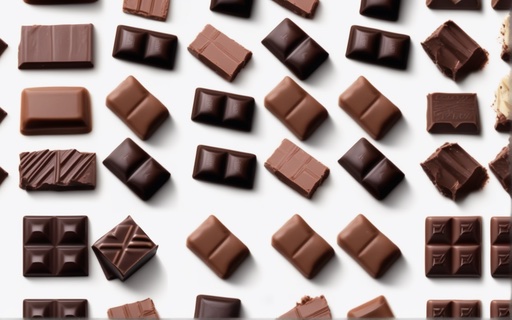Internet Asks: "Does Dark Chocolate Have More Caffeine Than Milk Chocolate?"
When it comes to chocolate, the choice between dark and milk varieties is often a matter of taste preference. However, for those sensitive to caffeine or watching their intake, the question of whether dark chocolate contains more caffeine than milk chocolate is of particular interest. This article explores the caffeine content in dark versus milk chocolate, providing a clear understanding for chocolate lovers and health-conscious consumers alike.
sponsored links

Caffeine in Chocolate: What Determines Its Level?
The caffeine content in chocolate is primarily determined by the cocoa content. Cocoa beans, the main ingredient in chocolate, naturally contain caffeine. Therefore, the type of chocolate and its cocoa concentration significantly influence its caffeine levels.
Dark Chocolate: A Higher Caffeine Profile
Dark chocolate is known for its higher cocoa content, which typically ranges from 70-85% or even higher. This higher concentration of cocoa naturally translates into a greater amount of caffeine. On average, a 1-ounce serving of dark chocolate can contain between 12 and 25 milligrams of caffeine.
Milk Chocolate: Lower Caffeine Levels
In contrast, milk chocolate contains more milk solids, sugar, and a lower percentage of cocoa. As a result, its caffeine content is significantly lower. A similar 1-ounce serving of milk chocolate usually contains about 5-10 milligrams of caffeine.
Why the Difference?
The variance in caffeine content can be attributed to the chocolate manufacturing process:
-
- Cocoa Solids: Dark chocolate has a higher ratio of cocoa solids to milk and sugar, whereas milk chocolate has a higher ratio of milk and sugar to cocoa solids.
-
- Cocoa Processing: The method and duration of processing cocoa beans can also impact the caffeine level, although this is less significant compared to the actual cocoa content in the final product.
sponsored links
Does White Chocolate Contain Caffeine?
In the discussion of caffeine content in different types of chocolate, white chocolate stands apart. Unlike its darker counterparts, white chocolate typically contains no caffeine. This is because white chocolate is made from cocoa butter, sugar, and milk solids, without the cocoa solids that give dark and milk chocolates their caffeine content. Cocoa butter, the fat derived from cocoa beans, is naturally caffeine-free. Therefore, those who are sensitive to caffeine or wish to avoid it can safely indulge in white chocolate without concern for its caffeine content. However, it's always advisable to check the ingredient list, as some brands might add small amounts of cocoa solids or flavorings that could contain caffeine.
Health Considerations and Preferences
For those sensitive to caffeine, understanding this difference is crucial. Dark chocolate, while richer in caffeine, also offers greater health benefits due to its higher concentration of antioxidants and lower sugar content. However, for those who prefer a milder flavor or need to limit their caffeine intake, milk chocolate may be the more suitable choice.
Conclusion
It’s clear that dark chocolate contains more caffeine than milk chocolate, a fact that stems from its higher cocoa content. While both types of chocolate have their unique flavors and health benefits, knowing their caffeine content is key for making informed dietary choices, especially for those with caffeine sensitivities or specific health goals.
Disclaimer: This article is for informational purposes only and should not be taken as medical advice. It's always recommended to consult with a healthcare professional for personalized dietary advice, particularly if you have health concerns related to caffeine consumption.
sponsored links
References
1. USDA Food Data Central. https://fdc.nal.usda.gov/fdc-app.html#/food-details/170273/nutrients
2. Cleveland Clinic - Heart-Healthy Benefits of Chocolate. https://my.clevelandclinic.org/health/articles/16774-heart-healthy-benefits-of-chocolate
3. Mayo Clinic - Caffeine content for coffee, tea, soda and more. https://www.mayoclinic.org/healthy-lifestyle/nutrition-and-healthy-eating/in-depth/caffeine/art-20049372
4. Harvard T.H. Chan School of Public Health. “Dark Chocolate.” https://www.hsph.harvard.edu/nutritionsource/food-features/dark-chocolate/
5. Healthline - How Much Caffeine in Chocolate?: https://www.healthline.com/nutrition/caffeine-in-chocolate
6. Whitakers Chocolates. What Are Cocoa Beans. https://www.whitakerschocolates.com/blog/what-are-cocoa-beans/
7. Lindt Canada. Is There Caffeine in Chocolate?. https://www.lindt.ca/en/your-life-with-lindt/is-there-caffeine-in-chocolate/
People are also reading...
Does Dark Chocolate Have Caffeine?
Does Dark Chocolate Have Caffeine in It?
See the answer to: "Does Dark Chocolate Have Caffeine in It?"
Calories In Steak?
Chicken Taco Calories?
Does Hot Chocolate Have Caffeine?
Are Carrots Acidic?
Orange Juice pH?
Does Kahlua Have Caffeine?
Calories In a Grilled Cheese?
Is Watermelon Acidic?
6 oz Steak Calories?
Are Strawberries Acidic?
Ready to level-up?
Create meal plans 10x faster, follow up with your clients through our mobile app, and never struggle with meal planning or recipe management again.